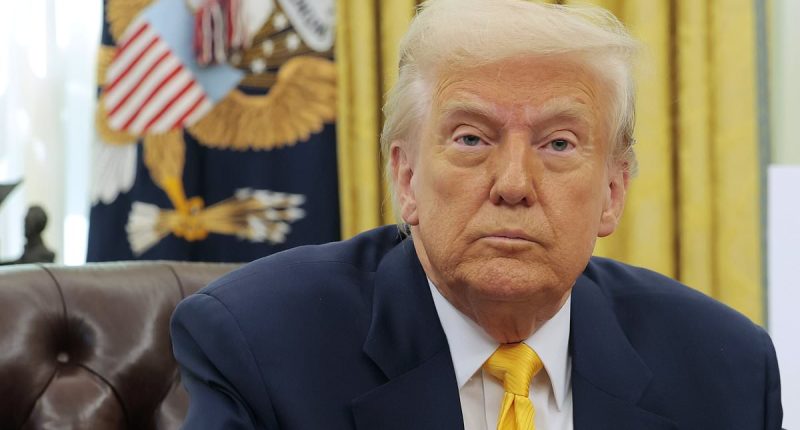Share this @internewscast.com
Republicans are intensely debating just how much they should reduce Medicaid in Donald Trump’s ‘big, beautiful bill’ as they work to deliver the tax cuts the president assured.
This expansive proposal, with anticipated costs reaching trillions of dollars, aims to extend Trump’s 2017 tax reductions and lower taxes on tips, overtime, and Social Security.
In a rally held in April, Trump declared, ‘In the coming weeks and months, we will pass the largest tax cuts in American history – and that will include no tax on tips, no tax on Social Security, and no tax on overtime. It’s called the one big beautiful bill.’
Republicans in Congress are now deliberating over how to make good on that promise, and they must find $1.5 trillion in spending cuts to offset the income lost due to the tax cuts.
However, negotiations over just how much to cut and where are proving tricky as Medicaid is popular in many GOP-controlled districts, potentially exposing the lawmakers to challenges in the midterms next year.
Attacking the government health program that provides healthcare for close to 80 million Americans, about 25 percent of the U.S. population, including children, the elderly and the sick, has been an unpopular position for any lawmakers.
Understanding that slashing a program that provides practically free healthcare is politically perilous for his party heading into the midterms, the president has remained opaque about what may happen.
‘We want to preserve Medicaid for the most vulnerable, for our kids, our pregnant women, the poor and disabled,’ he told a rally in Michigan last week. He also said in February that the program ‘isn’t going to be touched.’

Donald Trump has waffled on Medicaid cuts as Congress wrangles with how much of the subsidized healthcare program they want to slash as they search for savings to make good on the president’s promise of sweeping tax cuts

Speaker Mike Johnson (L) and Trump have been in near constant contact as the House leader works to craft the president’s massive, multi-trillion dollar legislative agenda

Care advocates attend 24-hour vigil at U.S. Capitol to share stories and urge lawmakers to protect Medicaid on May 07, 2025 in Washington, D.C.
The program costs about $880 billion annually, as each enrollee spends a median $7,000 to $9,000, according to Medicaid data.
Republicans must find $880 billion in cuts over 10 years to finance the tax cuts this year. That $88 billion in savings annually will come, in part, from Medicaid reform, party leadership has said.
And though some in the GOP see the program as a piggy bank to pull from, others are warning the situation is much more treacherous.
Leaving Washington on Thursday after the last votes of the week, GOP lawmakers were perplexed on how to appropriately filet the program to every member’s liking.
‘There’s a lot, there’s 20 plus issues, I think, that are still major variables on whether any of this can come together,’ Conservative House Freedom Caucus (HFC) member Chip Roy told reporters on Thursday.
He and other conservatives are pushing to reform the program and whittle down how many individuals can enroll in the subsidized healthcare.
Requiring Medicaid recipients to work to receive benefits and cutting the amount of federal dollars flowing to the program are on the table for the GOP.
‘Work Requirements are important,’ Roy told reporters. ‘You shouldn’t be having the people who should work, can work, getting benefits without working.’


GOP members differ on how much Medicaid shut be slashed. Roy, a conservative House Freedom Caucus member is advocating for deep cuts while Bacon, who was elected in a district Kamala Harris won, has expressed doubts over major reform to the program

Rep. Pramila Jayapal, D-Wash., speaks at a Medicaid rally in front of the Capitol. Democrats have been fighting back against GOP reforms

Doctors do an ultrasound on a pregnant woman during a pop-up health clinic in Alabama last year. The pop-up was sponsored by a state program, which receives federal funding
‘You shouldn’t have the ineligible getting benefits if they’re, in fact, ineligible,’ the Texas Republican continued, adding the reforms need to be ‘transformative’ to root out those ‘gaming’ the system.
Though cuts are also majorly unpopular for some in the party, too.
‘I’ll hopefully get to talk to leadership about it a little later,’ House Energy and Commerce Committee Chair Brett Guthrie, R-Ky., told reporters on Wednesday after a private meeting with Democrats on what portions of Medicaid to cut. ‘So we’ll see.’
Centrist Republican Rep. Don Bacon, R-Neb., said after the meeting that if Republicans vote on a bill that reforms federal financing of state Medicaid programs, they might not succeed.
‘I don’t think these measures will pass the House, let alone the Senate,’ he said about the current proposal.
Democrats see the GOP’s Medicaid cuts as risky too.

Trump poses with Mehmet Oz after being sworn-in as the administrator of the Centers for Medicare and Medicaid Services at the Oval Office of the White House, April 18, 2025 in Washington, D.C.
‘You see the fight playing out right there because people understand Medicaid is extremely popular,’ progressive caucus leader Rep. Pramila Jayapal, D-Wash., told reporters on Thursday.
She noted how the program ‘covers nursing home care, covers births, including a significant portion of births in Mike Johnson’s home state of Louisiana.’
Speaker Mike Johnson has said repeatedly that Medicaid reform is a critical component of the ‘big, beautiful bill,’ though the question of how much is seemingly dividing his narrow majority.
Whenever Johnson and Republicans finalize their work on the trillion dollar legislative package they will only be able to lose a handful of votes to advance the bill to the Senate.
Currently, the GOP majority is 220 – 213, which means they can only lose three votes and still have Trump’s agenda pass.
‘As far as Medicaid goes, when you have six out of 10 individuals on Medicaid, able bodied and not working, there’s got to be some reforms,’ HFAC member Rep. Andy Ogles, R-Tenn., told the Daily Mail.
‘It’s intended for, you know, at risk children, single moms, the at risk population. So get your butt to work and contribute to the process.’
When asked about the appetite for major cuts with narrow margins in the House, Ogles admitted he would personally want to make even deeper cuts to Medicaid.
‘But obviously we’ve got a slim majority,’ he added.
















